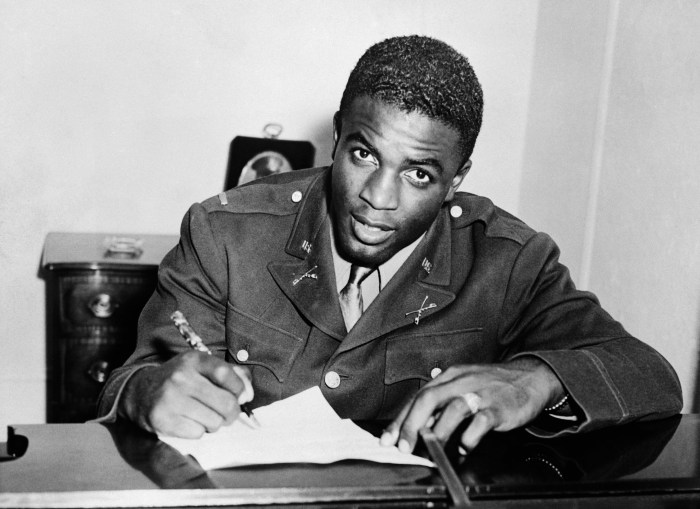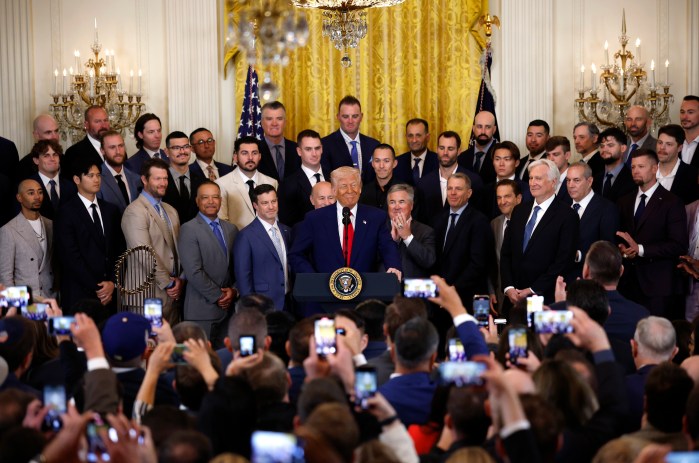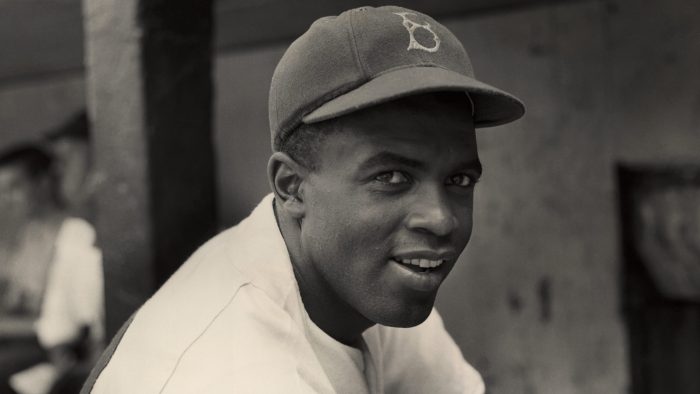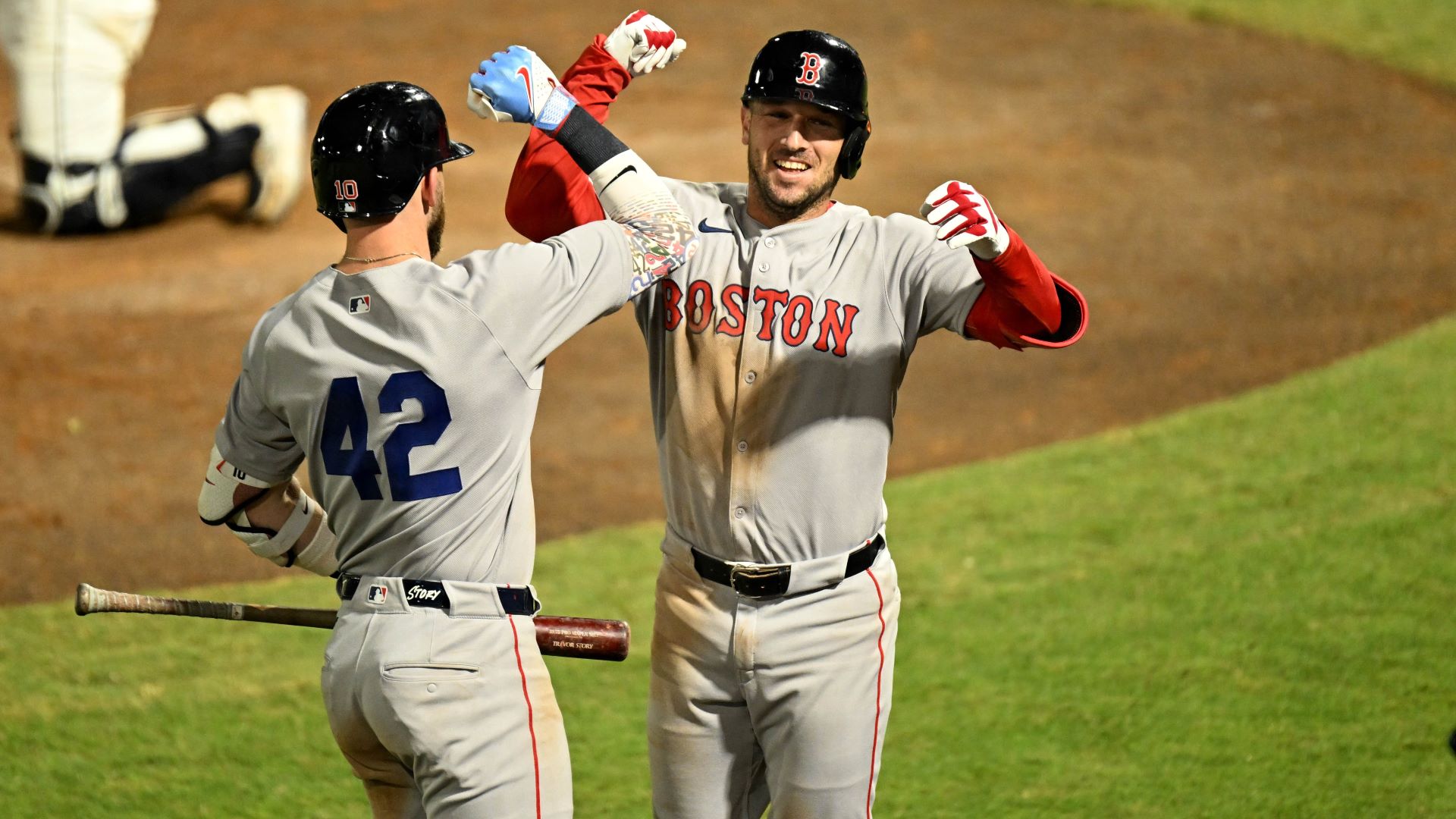A few days after the reigning World Series champion Los Angeles Dodgers’ White House visit last week, I asked the team’s manager, Dave Roberts, about the obligation that came with not only celebrating Jackie Robinson’s legacy but protecting it in light of the Trump administrations’ attempt to minimize his military contributions.
“It’s a responsibility, certainly wearing a Dodgers uniform,” Roberts, whose mother is Japanese and father is African American, said from the dugout at Nationals Park in Washington, D.C. In 2016, he became the first Black manager in Dodgers history. This came nearly 30 years after former general manager Al Campanis said African Americans lacked the leadership qualities to be a “field manager or perhaps general manager.”
“It starts by trying to appreciate what he did for people of color, inside and outside of baseball, to keep the fire burning, protect, but also advocate and celebrate Jackie Robinson Day,” Roberts said.
Roberts wasn’t wrong, but his comments came off like boilerplate verbiage rather than a heartfelt message about Robinson. What Roberts refrained from addressing was the anxiety in the air. Today, Major League Baseball celebrates its 21st Jackie Robinson Day. The most consequential date on MLB’s early calendar comes nearly a month after his military legacy was temporarily removed from the Department of Defense’s website last month. Outside of Roberts’ comments to me last week, the Dodgers have largely remained quiet on the situation. Major League Baseball, as a league, has said nothing.
“It’s an encapsulation of where we are as a society where one person can take the highest levels of several industries and make them wallflowers,” one source close to Major League Baseball said. “They’re scared of Trump.”
Many people around Los Angeles and baseball at large have noticed the silence and hesitation to publicly protect Robinson, a man whose influence spans far beyond baseball.
“This type of neglect is not merely an oversight. It’s a failure to honor the very principles he stood for,” said Dr. Christina L. Myers, a journalism professor at Michigan State University whose work has focused on the intersection of race and media. “Invoking his name without honoring the full scope of his legacy — including his resistance to racism in the military — reflects exactly the kind of selective memory that his story warns us against.”
Few acronyms have elicited widespread dread in American society in 2025 like D.E.I., short for diversity, equity and inclusion. On January 22, Donald Trump’s administration unleashed a series of executive orders hellbent on eradicating the initiative. On Robinson’s page, the acronym was preceded by “sports heroes.”

Bettmann / Contributor
Two hours after Trump signed the order, Pentagon spokesman John Ullyot quoted Secretary of Defense Pete Hegseth saying, “DEI is dead at the Department of Defense,” and that the department was ecstatic at the rapidness of the compliance. An hour later, a backtrack came in the form of a statement led by the sentence, “Everyone at the Defense Department loves Jackie Robinson.” Twenty minutes after that, the page was restored. (Ullyot, who referred to “D.E.I.” as “Discriminatory Equity Ideology,” was immediately reassigned to a new role in the department.)
The Trump administration is no stranger to controversial measures or tactics in the Robinson situation, but Major League Baseball largely chose not to address the matter publicly. When the Dodgers visited the White House to commemorate their 2024 World Series title, Robinson’s name wasn’t mentioned.
Why Robinson’s military legacy should matter to the Dodgers only takes a simple glance at his life’s timeline. Robinson spent roughly two years in the military during World War II. During that time, he served as a second lieutenant and part of the Army’s “Black Panthers” 761 tank battalion. Much of his time was served in segregated units. In July 1944, Robinson was taken into custody after refusing to move to the back of an Army bus. Despite being court-martialed, Robinson was later acquitted and served out his time as a coach for Black Army athletic teams until he was honorably discharged in November 1944. Four years later — and a year after his Major League debut — President Harry S Truman signed an Executive Order desegregating the military. Robinson’s role in integrating two of America’s most cherished entities, the military and baseball, is paramount. Peeling back the layers further, the Dodgers are near the epicenter of the moment that kickstarted what would soon become known as the modern Civil Rights Movement.
Though he wouldn’t make his Major League debut until 1947, Robinson signed with the then-Brooklyn Dodgers in the fall of 1945. In his autobiography, I Never Had It Made, Robinson reflected on the plethora of Black talent he played with at the time. He admitted that all were just as gifted, if not more in some cases, as he was. But when it came to Black players, the issue was never about talent.
“When I look back at what I had to go through in Black baseball,” Robinson wrote, “I can only marvel at the many Black players who stuck it out for years in the Jim Crow leagues because they had nowhere else to go.”
In Robinson, Brooklyn Dodgers general manager Branch Rickey saw a young man who could withstand the relentless onslaught that a Black man playing in the all-white major leagues would encounter, he’d already done so in the military. Racist taunts from the crowd were only one worry. Blatant attacks by opposing white players, jeers from opposing managers, and never-ending death threats were also part of what Rickey dubbed a “noble experiment.”
Since the beginning of the year, capitulation has been a theme. Though companies and institutions like Apple, Uber, Costco, Delta Airlines, Harvard University and others have resisted federal pressure to eliminate their DEI programs and initiatives, far more industries, such as law firms, tech companies (Amazon, Meta and Google), and higher education institutions, have all bent the knee towards the current administration’s demands.
Mark Walter, the primary owner of the Dodgers and CEO of Guggenheim Capital Value, is a longtime Democratic and MLB Commissioner’s PAC contributor. His $100M donation in relief efforts following the L.A. wildfires was higher than the payroll of eight franchises. Yet, Walter, whose estimated net worth is north of $6B, is more of an anomaly than the norm. A 2024 study found that since 2020, team owners of North American sports leagues (MLB, NBA, NFL, etc.) have contributed over $130 million in federal elections. Of that amount, close to 95% went towards Republican campaigns, Super PACs, and candidates. A concentrated group of donors accounted for nearly $106 million, including Ray Davis (Texas Rangers) and Charles Johnson (San Francisco Giants). Aside from Arthur Blank (Atlanta Falcons), the other seven super donors dedicated funds overwhelmingly to Republican candidates and causes.

Kevin Dietsch/Getty Images
Digging further, OpenSecrets, a Washington, D.C.-based non-profit dedicated to tracking money in American politics and its impact on policy-making, uncovered that the amount of money donated to Republicans during the 2024 election cycle to the Commissioner’s PAC more than doubled that of 2020. Donations to both parties were halted following the January 6 insurrection at the U.S. Capitol. Yet, in 2024, the PAC contributed to the campaigns of eight House Republicans who voted to reverse the results of the 2020 election.
Without painting the entire league with a broad brush, it does provide a contextual nuance as to why the slight against Robinson was met with no pushback in the MLB universe. Robinson is amongst the most accomplished baseball players in the sport’s history. Breaking the color barrier and his time in the Negro Leagues only account for part of a Hall of Fame portfolio, which also includes an MVP award, World Series title, seven All-Star appearances, and a batting title. Robinson is, without question, the game’s most consequential and impactful player and a front-line member of what America has come to define as its “greatest generation.”
The temporary erasure of Robinson’s military legacy is significant because it’s a microcosm of the attack on Black history that’s been levied on society under the guise of removing critical race theory from our institutions. If it can happen to Jackie Robinson — or the Tuskegee Airmen — critics argue, then any Black man, woman, or child is fair game.
“You can take away DEI references, but you can’t take away the ideologies of valuing individuals who changed our game for the better,” said former MLB player and current ESPN/MLB Network analyst Xavier Scruggs, who also served as a DEI consultant for the St. Louis Cardinals in 2021. “American history is built on recognizing the value of people and allowing individuals to be comfortable being their true selves, regardless of race, gender, ethnicity, religion, and more. [MLB commissioner Rob] Manfred can’t limit himself to saying ‘the right things,’ but also continue implementing initiatives highlighting what makes our game so special. What makes it so special is the inclusivity of growing markets from a players’ standpoint and fan perspective.”
Scruggs continued, “Without Jackie Robinson, that growth never even takes place from the jump.”
Last year, MLB reported a record $12.1B in revenue — a half-billion-dollar increase from 2023. The question remains whether morals and integrity can ever truly coexist with the importance of a bottom line. History has repeatedly shown the answer to be no. Even Robinson himself knew the answer came with a caveat.
“Money is America’s God,” Robinson reflected in his memoir over a half-century earlier, “and business people can dig Black people if it coincides with green power.”
The validity of Robinson’s words is very much alive today.
“The more we take [Black stories] away, the more we are sending the message that those perspectives don’t matter or, even worse, exist,” Scruggs said. “In an era in which we are truly understanding the importance of storytelling, it would seem counter-productive to start eliminating the best way to connect the past to our future stories.”
For Myers, the attempted obliteration is by design.
“This silence highlights how easily Black athletes are celebrated in symbolic ways — jerseys retired, statues unveiled, ceremonial first pitches,” she said, “while the deeper, more challenging aspects of their lives and contributions are neglected or ignored.”
Symbolism is, indeed, still a necessary tool. How Major League Baseball and the Dodgers respond to this moment is equally important. Having Black service members throw out the first pitch on Jackie Robinson Day is a powerful gesture. It would not only be a callback to Robinson’s experience in the military but also a reminder of what Black folks endured during the vice grip of Jim Crow oppression.
For a league that annually brings in billions — partly because of the diversity of its players, a reality directly tracing back to Robinson’s debut — actions to support symbolism would go a long way toward actually honoring Robinson’s legacy.
“MLB could partner with Black veteran organizations to amplify their voices and experiences or host community dialogues or educational events in every MLB city focused on Robinson’s enduring impact,” Myers said. “Symbolism is easy … what Robinson deserves is substance.”
The truth is that Jackie Robinson was a diversity hire. He never intended to be the force he became because American laws and practices were set up against him at every turn. That’s why a deleted webpage matters far beyond a wi-fi connection or an unhinged social media post by the most powerful force in the free world. Or whatever “free” resembles in 2025 and beyond.
What Robinson stood for matters far beyond a day. His words and actions still matter because America never listened to or learned from them.

